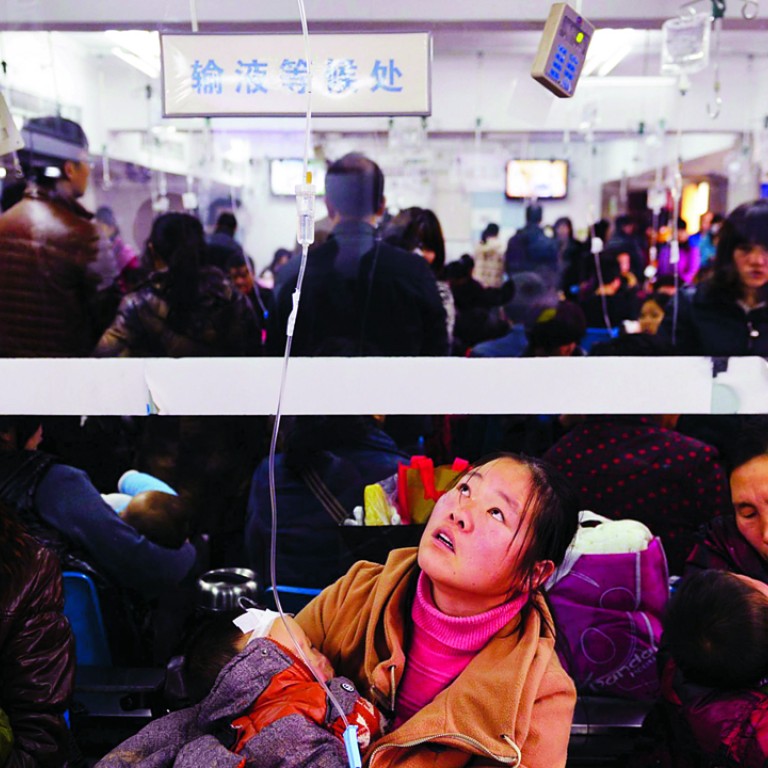
Medical parasites: Scalpers prey on sick seeking appointments with China’s top doctors
An online video puts the spotlight on profiteers cashing in on demand for medical consultations
Profiteering scalpers trading in much sought-after hospital appointments will only be eradicated when doctors enjoy better and more flexible work conditions and authorities make a sustained effort to encourage people to seek careers in medicine, industry professionals say.
The suggestions come after a video of an outraged woman was widely viewed online last month. The woman had queued for two days at Beijing’s Guanganmen Hospital, a top traditional Chinese medicine medical centre, but was reportedly told that she would not be able to book a 300 yuan (HK$355) appointment with a specialist unless she paid 4,500 yuan to a scalper, whom she suspected of colluding with a security guard.
The clip resonated with viewers and respondents to a Sina.com survey, more than a quarter of whom said they had paid a scalper to get an appointment with a doctor.
Beijing police responded to the clip by rounding up 18 alleged scalpers from four hospitals but the effort is just the latest in a long line of crackdowns that have failed to eradicate the profiteers over the last two decades.
READ MORE: Investigation launched after scalpers found fixing hospital bookings in China, making patients pay sky-high prices to see doctors
Each morning, would-be patients queue outside the country’s top hospitals hoping to secure one of the limited number of appointment slots with doctors. Members of the public can try to book appointments directly with specialists, even the top ones at the most prestigious hospitals, without a referral.
The appointment fees are set by the government, with patients paying 5 yuan to book a slot with a junior doctor and 14 yuan for a consultation with a senior medic. Some hospitals also have specialist centres that charge up to 300 yuan per visit.
Those who miss out can try their luck with scalpers – but at greatly inflated prices.
The introduction of apps and online booking services has done little to ease the demand.
Wen Jianmin, director of orthopaedics at Beijing’s Wangjing Hospital, said scalpers had flourished as poor work conditions had taken their toll on the profession.
“Decades of low pay, high workloads and a hostile work environment have resulted in fewer and fewer top-notch doctors in the industry and that’s why there are so many scalpers. There’s high demand and low supply,” said Wen, whose appointment slots went for up to 2,000 yuan on the black market.
READ MORE: Hospital in China occupied by ‘triads’ over financial dispute
Wen said the doctors should be allowed to operate outside registered public hospitals, opening up the sector to greater competition and attracting more people into the profession with higher pay.
“Without any attempts to remedy the situation there will be more and more scalpers because it will be more and more difficult to see a really good doctor,” he said.
Yu Guangyan, a professor of oral surgery at Peking University’s school of stomatology, said patients across the country directly sought the best specialists at top hospitals but most cases could be treated at lower-level medical centres. “If we allow only lower-level hospitals to refer patients to top specialists at the top hospitals, there would be no opportunity for scalpers,” Yu said.
Such a referral system should be countrywide so that hospitals in all provinces could send patients to prestigious institutions, he said. Fees for doctors should also reflect their seniority in the system to encourage patients to see medics at lower levels.
Dai Wenxin, an endocrinologist with the Peking Union Medical College Hospital, said referral systems could also be open to abuse and patients should accept that appointments were difficult to get with top specialists in any country. Dai said health authorities had to find a way to make sure those in the greatest need had access to top services.
“One solution is for hospitals to stop taking bookings for top specialists and allow only junior doctors to pass on complex cases to senior staff,” Dai said.

